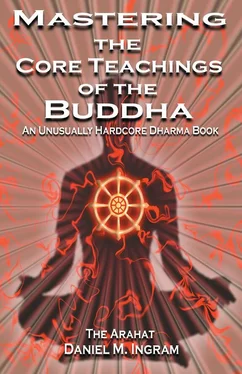Daniel Ingram - Mastering the Core Teachings of Buddha - An Unusually Hardcore Dharma Book
Здесь есть возможность читать онлайн «Daniel Ingram - Mastering the Core Teachings of Buddha - An Unusually Hardcore Dharma Book» весь текст электронной книги совершенно бесплатно (целиком полную версию без сокращений). В некоторых случаях можно слушать аудио, скачать через торрент в формате fb2 и присутствует краткое содержание. Год выпуска: 2009, ISBN: 2009, Издательство: Aeon Books, Жанр: Старинная литература, на русском языке. Описание произведения, (предисловие) а так же отзывы посетителей доступны на портале библиотеки ЛибКат.
- Название:Mastering the Core Teachings of Buddha - An Unusually Hardcore Dharma Book
- Автор:
- Издательство:Aeon Books
- Жанр:
- Год:2009
- ISBN:9781904658405
- Рейтинг книги:5 / 5. Голосов: 1
-
Избранное:Добавить в избранное
- Отзывы:
-
Ваша оценка:
- 100
- 1
- 2
- 3
- 4
- 5
Mastering the Core Teachings of Buddha - An Unusually Hardcore Dharma Book: краткое содержание, описание и аннотация
Предлагаем к чтению аннотацию, описание, краткое содержание или предисловие (зависит от того, что написал сам автор книги «Mastering the Core Teachings of Buddha - An Unusually Hardcore Dharma Book»). Если вы не нашли необходимую информацию о книге — напишите в комментариях, мы постараемся отыскать её.
Mastering the Core Teachings of Buddha - An Unusually Hardcore Dharma Book — читать онлайн бесплатно полную книгу (весь текст) целиком
Ниже представлен текст книги, разбитый по страницам. Система сохранения места последней прочитанной страницы, позволяет с удобством читать онлайн бесплатно книгу «Mastering the Core Teachings of Buddha - An Unusually Hardcore Dharma Book», без необходимости каждый раз заново искать на чём Вы остановились. Поставьте закладку, и сможете в любой момент перейти на страницу, на которой закончили чтение.
Интервал:
Закладка:
Sometimes it seems to be our body, but sometimes it seems to be watching our body. Isn’t it strange how we are so used to this constant redefinition of ourselves that we never stop to question it? Question it!
This odd sense of an unfindable watcher to which all of this is happening yet which is seemingly separate from all that is happening, which sometimes seems in control of “us” and yet which sometimes seems at the mercy of reality: what is it really? What is going on here?
One of my teachers once wisely said, “If you are observing it, then it isn't you by definition!” Notice that the whole of reality seems to be observed. The hints don't get any better than this. Here are three more points of theory that are very useful for insight practices and one’s attempts to understand what is meant by no-self:
1. There are absolutely no sensations that can observe other sensations! (Notice that reality is made entirely of sensations.) 2. There are no special sensations that are uniquely in control of other sensations.
3. There are no sensations that are fundamentally split off from other sensations occurring at that moment.
To begin to unravel this mystery is to begin to awaken. Simply put, reality with a sense of a separate watcher is delusion, and unconditioned reality, reality just as it is, is awakening.
Quick point here: people can use the truth of no-self to rationalize all sorts of strange behaviors because they misunderstand it as nihilism.
“It's all illusion anyway,” they might say. It absolutely isn't. All of this can only be understood at the level that makes the difference by simple, clear, precise practice, so just keep at it.
One more related thing here that is very important: ego is a process of identification, not a thing in and of itself. It is like a bad habit, but it doesn't exist as something that can be found. This is important, as this bad habit can quickly co-opt the language of egolessness and come up with phrases as absurd as: “I will destroy my ego!” But, not being a thing, it cannot be destroyed, but by understanding our bare experience, our minds, the process of identification can stop. Any thoughts with “I,”
30
The Three Characteristics
“me,” “my” and “mine” in them should be understood to be just thoughts which come and go. This is not something you can talk yourself out of. You have to perceive things as they are to stop this process.
A commonly heard one is, “I am always identifying with things, I am always attached to things,” with the implication that there is actually someone who is “bad” for “doing” this. Try to avoid this sort of story making, this sort of unmindful mental spinning, but be kind to yourself if it happens. The sensations that make up these thoughts are just empty in the best of ways.
So who is it that awakens? It is all of this transience which awakens, though for a more mystical, thorough and seemingly ridiculous answer take a look at No-self vs. True Self in Part III.
We don't have to sort this all out at once. We can begin with simple steps and the rest will fall into place if we are diligent and skillful.
So, now that I have made the possible seem mystical and abstruse, hopefully I will make it seem very attainable. The big, practical trick to understanding egolessness is to tune into the fact that sensations arise on their own in a natural causal fashion, even the intentions to do things.
This is a formal practice instruction.
This may sound hard until you think about it and then perhaps it may become so obvious it may seem trite. But it isn't, and
understanding it again and again, moment to moment, can bang the truth into us, and if we fully get it we will be free. So, start and perhaps remain with obvious things like physical sensations. They just show up and check out over there, don't they? Tune into this. Allow this quality of things arising and passing on their own to show itself. Notice that whatever is observed isn't “us.” Do this again and again and again at a rate of one to ten times per second as before. That is all there is to it.
See, that wasn't so hard!
Thoughts, the breath, and all of our experience don't quite seem to be in our control, do they? That's it! Know this moment to moment.
Don't struggle too much with reality, except to break the bad habits of being lost in stories, poor concentration, and a lack of understanding of the Three Characteristics. Allow vibrations to show themselves and tune into the sense that you don't have to struggle for them to arise. Reality 31
The Three Characteristics
just continues to change on its own. That's really it. Investigate this again and again until you get it. Notice that this applies to each and every sensation that you experience.
So, while we can direct the mind to penetrate into phenomena with great precision and energy, we can also sit quietly and allow reality to just show itself as it is. Both perspectives are important and valuable, and being able to draw on each along the way can be very helpful. Said another way, we can realize that reality is already showing itself, settle quietly into this moment, and be clear and precise about it.
Obviously there is a bit of a paradox here relating to effort and surrender. In many ways it is at the heart of the spiritual life. There is a lot of advice available on this point, but in terms of insight meditation practice I would say this: If when meditating you can perceive the arising and passing of phenomena clearly and consistently, that is enough effort, so allow this to show itself naturally and surrender to it. If not, or if you are lost in stories, then there are some teachings coming up in the other lists that may help.
For day-to-day reality, the specifics of our experience are certainly important, but for insight into the truth of things in meditation they largely aren't. Said another way, it is neither the object of meditation, the causes of the object of meditation, nor the significance of the object of meditation, but the truth of the sensations that make up that “object”
which must be understood. Once you can tell what is mind and what is body, that's for the most part enough. So don't make stories, but know this: things come and go, they don't satisfy, and they ain't you. That is the truth. It is just that simple. If you can just not get to caught up in the content and know these simple, basic and obvious truths moment to moment, some other wordless and profound understanding may arise on its own.
A useful teaching is conceptualizing reality as six sense doors: touch, taste, seeing, hearing, smelling, and thought. It may seem odd to consider thought as a sense door, but this is actually much more reasonable than the assumption that thoughts are an “us” or “ours” or in complete control. Just treat thoughts as more sensations coming in which must be understood to be impermanent, unsatisfactory and not self. In this strangely useful framework, there are not even ears, eyes, 32
The Three Characteristics
skin, a nose, a tongue, or a mind. There are just sensations with various qualities, some of which may imply these things for an instant.
Bare experience is just dancing, flickering color, form, energy and space, basically, and the knowledge of these (which is not as fundamentally different from them as you might suspect). Try to stay close to that level when you practice, the level of the simple, direct, obvious, literal. But whenever you are lost in interpretation much beyond this, that ain't insight meditation, as much as people would like it to be. Have I said this enough? Okay, then.
I realize that most people go into meditation looking for stability, happiness, and comfort in the face of their own existence. I have just said that I have spent many years cultivating extreme experiential instability, careful awareness of the minutia of my suffering and the clear perception that I don’t even exist as a separate entity. Why this would be a good idea is a very complex topic that I will try to deal with later, but I can honestly say that these practices are without doubt the sanest thing I have ever done in my life.
Читать дальшеИнтервал:
Закладка:
Похожие книги на «Mastering the Core Teachings of Buddha - An Unusually Hardcore Dharma Book»
Представляем Вашему вниманию похожие книги на «Mastering the Core Teachings of Buddha - An Unusually Hardcore Dharma Book» списком для выбора. Мы отобрали схожую по названию и смыслу литературу в надежде предоставить читателям больше вариантов отыскать новые, интересные, ещё непрочитанные произведения.
Обсуждение, отзывы о книге «Mastering the Core Teachings of Buddha - An Unusually Hardcore Dharma Book» и просто собственные мнения читателей. Оставьте ваши комментарии, напишите, что Вы думаете о произведении, его смысле или главных героях. Укажите что конкретно понравилось, а что нет, и почему Вы так считаете.












